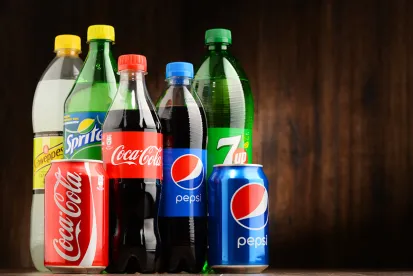On January 10, 2023 Politico reported that the Federal Trade Commission (“FTC”) has launched antitrust investigations into Pepsi and Coca Cola.1 According to the article, the “companies’ pricing strategies are being scrutinized” for “potential price discrimination in the soft drink market.”2
This investigation reveals that companies face, yet again, another front for potential government investigations as the antitrust agencies expand their enforcement efforts. Moreover, there is also risk of a potential uptick in private litigation (and treble damages exposure), which often piggy-back off of these investigations. These risks should be more than sufficient reasons for corporate in-house counsel in a wide range of sectors—agriculture and food, healthcare products, pharma, private equity, retail, etc.—to revisit current and future pricing efforts to assess the risk of a potential price discrimination issue. This issue becomes more daunting for organizations with a multi-channel pricing strategy where products are being sold at different prices to different customers/resellers.
The investigation into Pepsi and Coca Cola, assuming that it is confirmed, will be the first FTC Robinson-Patman Act (“RPA”) enforcement matter in more than twenty years.3 In fact, the 1936 law had been largely out of favor with the federal antitrust agencies as early as the late 1970s, so much so that scholars noted that “federal agency Robinson-Patman enforcement is dead.”4 Moreover, the Antitrust Modernization Commission recommended repealing the RPA: “The [RPA] is fundamentally inconsistent with the antitrust laws and harms consumer welfare. It is not possible to reconcile the provisions of the Act with the purpose of antitrust law; repeal of the entire Robinson-Patman Act is the best solution.”5
The dead, apparently, has risen. President Biden referenced using the RPA as part of the government’s antitrust toolbelt in his July 2021 Executive Order on competition.6 FTC Chair Lina Khan subsequently promised to reinvigorate the agency and expand its enforcement mandate. In addition to the expansion of the FTC Act,7 the agency also signaled last year its interest in returning to the enforcement of the RPA.8 FTC Commissioner Alvaro Bedoya’s September 2022 “Return to Fairness” speech crystalized this new position: “Certain laws that were clearly passed under what you could call a fairness mandate – laws like Robinson-Patman – directly spell out specific legal prohibitions. Congress’s intent in those laws is clear. We should enforce them.”9
While the RPA covers a broad range of claims, the most common one relates to manufacturer/supplier price discrimination with its resale customers. An RPA Section 2(a) claim requires a manufacturer to make two contemporaneous sales of commodities of like grade and quality to two competing resellers into interstate commerce at two different prices that result in competitive injury.10 While there are certain, albeit complicated affirmative defenses to companies facing price discrimination claims, contrary to popular belief, volume discounts (such as to major national customers) is not one of them.
FOOTNOTES
1 Josh Sisco, “Pepsi, Coke soda pricing targeted in new federal probe,” Politico, January 10, 2023, available at https://www.politico.com/news/2023/01/09/pepsi-coke-soda-federal-probe-00077126
2 Id.
3 FTC Press Release, March 8, 2000, “World's Largest Manufacturer of Spice and Seasoning Products Agrees to Settle Price Discrimination Charges,” available at https://www.ftc.gov/news-events/news/press-releases/2000/03/worlds-largest-manufacturer-spice-seasoning-products-agrees-settle-price-discrimination-charges.
4 D. Daniel Sokol, The Transformation of Vertical Restraints: Per Se Illegality, the Rule of Reason, and Per Se Legality, 79 ANTITRUST L.J. 1003, 1014 (2014) (noting that in the 1960s, the government brought more than 600 cases; since then, the FTC has only brought a handful of cases) available at https://scholarship.law.ufl.edu/cgi/viewcontent.cgi?article=1561&context=facultypub; see Thomas E. Kauper, The Justice Department and the Antitrust Laws: Law Enforcer or Regulator?, 35 ANTITRUST BULL. 83, 99 (1990) (noting that the DOJ took the position that enforcement of the RPA was “economically unwise.”) available at https://journals.sagepub.com/doi/10.1177/0003603X9003500105
5 Antitrust Modernization Commission Report and Recommendations p. 330, April 2007, available at https://www.ftc.gov/system/files/ftc_gov/pdf/P221202Section5PolicyStatement.pdf
6 Executive Order on Promoting Competition in the American Economy, July 9, 2021, available at https://www.whitehouse.gov/briefing-room/presidential-actions/2021/07/09/executive-order-on-promoting-competition-in-the-american-economy/
7 FTC, “Policy Statement Regarding the Scope of Unfair Methods of Competition Under Section 5 of the Federal Trade Commission Act,” November 10, 2022, available at https://www.ftc.gov/system/files/ftc_gov/pdf/P221202Section5PolicyStatement.pdf
8 Dan Papskun, “FTC’s Khan Eyes Old Weapon to Crack Down on New Market Players,” July 7, 2022, Bloomberg Law, available at https://news.bloomberglaw.com/antitrust/ftc-eyes-seldom-used-pricing-law-to-crack-down-on-market-abuse
9 Prepared Remarks of Commissioner Alvaro M. Bedoya, FTC, “Returning to Fairness” Midwest Forum on Fair Markets: What the New Antimonopoly Vision Means for Main Street, September 22, 2022, available at https://www.ftc.gov/system/files/ftc_gov/pdf/returning_to_fairness_prepared_remarks_commissioner_alvaro_bedoya.pdf
10 FTC, “Price Discrimination: Robinson-Patman Violations, available at https://www.ftc.gov/advice-guidance/competition-guidance/guide-antitrust-laws/price-discrimination-robinson-patman-violations




 />i
/>i

